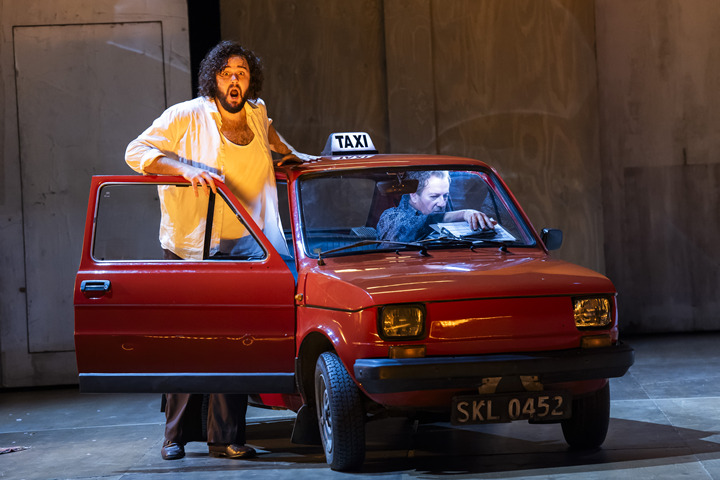| Opera Reviews | 27 April 2024 |
A powerful tale of two very different one-act operasby Catriona Graham |
|
Mascagni: Cavalleria Rusticana |
|
 |
|
|
Mascagni’s Cavalleria Rusticana and Rachmaninov’s Aleko – two very different one-act operas, or are they? In Opera North’s double-bill, directed by Karolina Sofulak, outsider Aleko joins a commune as a consequence of his actions in another life as Alfio. The continuity is provided by Robert Hayward in both roles and Andrès Presno as both his love rivals. Sofulak relocates Mascagni’s Sicilian village to 1970s Poland; Mamma Lucia’s shop has a lengthy queue when it opens for business but, by the time she has served her important customers (the local nomenklatura?) there is nothing left for the queue. Presno is a lyrical tenor; when we first hear him as Turridù in Cavalleria Rusticana, he sounds conversational, the emoting comes later. Helen Évora’s Lola seems cooler or, at least, her heart is not worn on her sleeve. The same could not be said about Santuzza (Giselle Allen), a very intense young woman, whom Turridù has clearly treated badly, albeit on the rebound from Lola. Into this mix comes Robert Hayward’s Alfio, Lola’s husband, proud of his new (to him) Fiat taxi. The acting of Hayward is outstanding and concentrated and as one with the music. Once he has learned that Turridù has been visiting Lola behind his back, he kills him less in a jealous rage than in cold despair, having invited him into the passenger seat of the taxi. There is a lot of incidental music – in both works – the best known being the Intermezzo. In each, a lot is going on, on stage, emotions being worked through or brooded over. There is a striking pieta scene where, in Santuzza’s inflamed imagination (we assume), Turridù is hung on the cross, with Lucia (Anne-Marie Owens), his mother, on one side, and Santuzza as the Magdalene, the fallen woman, on the other. The chorus work is excellent, too. Yes, the Easter hymn is well-known but, both in the sound and staging, it is highly charged and thrilling, heightened by Charles Edwards’ designs for set, costume and lighting and Tim Claydon’s movement direction. The beginning of Aleko mirrors the end of Cavalleria Rusticana, with Hayward and gun alone on the stage. Many years have passed and Hayward / Alfio is now Aleko, married to another young woman, Zemfira (Elin Pritchard), and living in a commune, full of colour, style and informality, unlike the stark shabbiness and rigid catholicism before. Pritchard’s voice has a clarity which cuts through whatever else is going on, but in a good way. They are a jolly lot, in the commune, and have settled down for a sociable evening, kicking off with Zemfira’s father telling how her mother ran off with another man when Zemfira was a toddler. History is about to repeat itself, but as tragedy rather than farce. While the chorus are dancing and singing in party-fashion, Zemfira is getting together with someone else (Presno). Aleko, however, can’t take it, and both Lola and Santuzza haunt him till, at dawn, with Zemfira and her new love about to leave, he kills again. As Zemfira’s father and sort-of father of the commune, Matthew Stiff is both a party-loving drunk and a figure of authority. With the shocked commune taking in the killing, he banishes Aleko, who is once more alone with his despair. Again, the chorus work is excellent and the sound they produce is spine-tingling. Meanwhile, in the pit, there is super playing from the orchestra, conducted by Antony Hermus. This production works well, thanks as much to the excellent acting skills of Hayward and the other principals as to their impressive singing. |
|
Photo © Tristram Kenton |
|







